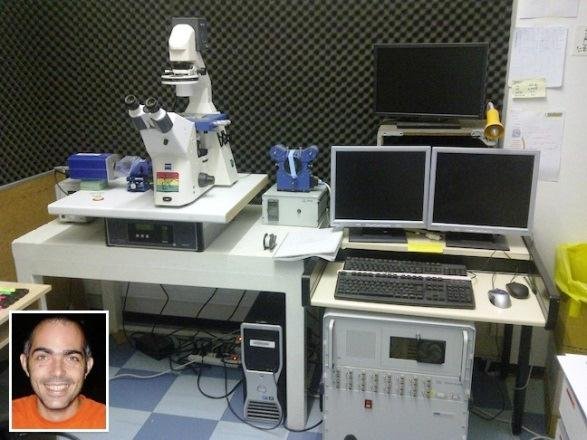Dr Pierre-Henri Puech is an INSERM staff scientist in the group of Pierre Bongrand working on forces at the molecular and cellular level to determine what are the physical cues that cells integrate in feeling and understanding their environment. He works on describing, among other topics, what are the physical parameters that a T cell measures when scanning an antigen presenting cell (APC). This is to determine whether the cell or the organism is facing an external perturbation such as a virus invasion or modification due to deterioration of cells, such as via cancerous transformation. Since this recognition goes through the interaction between the T cell receptor (TCR) and a peptide presenting protein (pMHC) at the surface of the APC, is it the duration of the bond between the pMHC and TCR (or off rate) , its strength, its on-rate or the interaction with the cytoskeleton that is the determining mechanisms of the read-out. Using fluorescence microscopy coupled to AFM, the question "how does this signal, mechanical or adhesive / recognition get integrated by the cell in order to understand and take a decision to change its function (for example either becoming activated or not)." can be addressed using phosphorylation or calcium reporting dyes. Such approaches are extended to cell cancer studies and to parasite / host interactions.
This is predominantly fundamental research work where Dr Puech is seeking to understand how cells physically understand the world they are living in and how they "play" in this world - how they function: either in a positive role (e.g. T cells) or a negative one (cancerous cells or parasites).
Before adding AFM to his techniques, Dr Puech used various micropipette-based techniques such as Biomembrane Force Probe, fluorescence microscopy, interference microscopy and simple microfluidic devices. In talking about working with JPK and their NanoWizard AFM system, Dr Puech says "It is simple and robust to use. It is designed for biological applications. It is particularly user friendly so that a biology student with no knowledge in instrumentation can learn it in less than a month. The AFM can be easily coupled to other techniques such as optics. I like the software because of it being Linuxbased with open access. It comes with a user-friendly force curve and image processing software, and also you can program the system using an easy to learn language (Jython) to follow non-standard procedures. Lastly, I think that JPK's technical support staff is very competent. I like their nice, efficient and rapid approach to helping me and my users."
For more details about JPK's specialist products and applications for the bio and nano sciences, please contact JPK on +49 30533112070, visit the web site: www.jpk.com or see more on Facebook: www.jpk.com/facebook.


